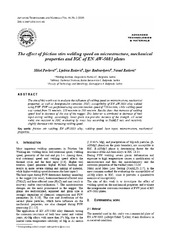Приказ основних података о документу
The effect of friction stirs welding speed on microstructure, mechanical properties and IGC of EN AW-5083 plates
| dc.creator | Pavlović, Miloš | |
| dc.creator | Radović, Ljubica | |
| dc.creator | Radisavljević, Igor | |
| dc.creator | Radović, Nenad | |
| dc.date.accessioned | 2021-03-10T14:08:49Z | |
| dc.date.available | 2021-03-10T14:08:49Z | |
| dc.date.issued | 2019 | |
| dc.identifier.issn | 2620-0325 | |
| dc.identifier.uri | http://TechnoRep.tmf.bg.ac.rs/handle/123456789/4281 | |
| dc.description.abstract | The aim of this work was to evaluate the influence of welding speed on microstructure, mechanical properties, as well as Intergranular corrosion (IGC) susceptibility of EN AW-5083 alloy welded using FSW. FSW was performed using constant rotation speed of 750 Rev/min, while welding speed was varied from 73 mm/min, 150 mm/min to 190 mm/min. Results show that increase of welding speed lead to decrease of the size of the nugget. This behavior is attributed to decrease of heat input during welding. Accordingly, lower grain size provides increase of the strength. All tested welds are resistant to IGC, evaluating by mass loss according to NAMLT test, and resistivity slightly decrease with increasing welding speed. | en |
| dc.relation | info:eu-repo/grantAgreement/MESTD/Technological Development (TD or TR)/34018/RS// | |
| dc.rights | openAccess | |
| dc.source | Advanced Technologies and Materials | |
| dc.subject | friction stir welding | en |
| dc.subject | EN AW-5083 alloy | en |
| dc.subject | welding speed | en |
| dc.subject | heat input; microstructure | en |
| dc.subject | mechanical properties | en |
| dc.title | The effect of friction stirs welding speed on microstructure, mechanical properties and IGC of EN AW-5083 plates | en |
| dc.type | article | |
| dc.rights.license | ARR | |
| dc.citation.epage | 13 | |
| dc.citation.issue | 1 | |
| dc.citation.other | 44(1): 7-13 | |
| dc.citation.rank | M24 | |
| dc.citation.spage | 7 | |
| dc.citation.volume | 44 | |
| dc.identifier.doi | 10.24867/ATM-2019-1-002 | |
| dc.identifier.fulltext | http://TechnoRep.tmf.bg.ac.rs/bitstream/id/1945/4278.pdf | |
| dc.type.version | publishedVersion |

